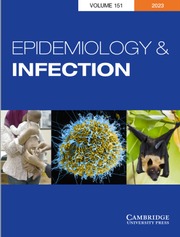Article contents
Binding to and antibacterial effect of aztreonam, temocillin, gentamicin and tobramycin on human faeces
Published online by Cambridge University Press: 19 October 2009
Summary
Aztreonam, temocillin, gentamicin and tobramycin were studied for their effect on the human faecal flora in vitro and for their usefulness for selective decontamination (SD) of the gastrointestinal tract. The sensitivities of the obligately anaerobic flora and the Gram-negative facultatively anaerobic bacteria were determined and the ratio was expressed as SD factor. Tho high SD factor of the flora from most subjects for aztreonam and tobramycin indicates that the drugs are useful for SD in contrast to temocillin and gentamicin. Binding to and subsequent release of tobramycin from faeces are presumed to facilitate the maintenance of adequate concentrations in the intestine despite the discontinuous intake.
- Type
- Research Article
- Information
- Copyright
- Copyright © Cambridge University Press 1985
References
REFERENCES
- 10
- Cited by


